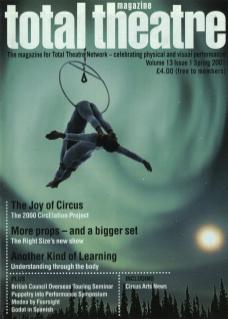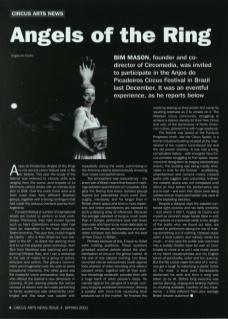Anjos do Picadeiros (Angels of the Ring) is a bi-annual clown festival held in Rio de Janeiro. This year the scope of the festival was widened to include skills acts ranging from the comic acro-trapeze of La Minima to various artists with an intense style akin to DV8. Over the week there were acts from more than forty different Brazilian groups, together with a strong contingent that had made the arduous overland journey from Argentina.
For each festival a number of international artists are invited to perform or lead workshops. Previously, they had invited figures such as Nani Colombioni whose style had been an inspiration to the host company, Teatro Anonimo. This year they invited Angela de Castro – who is from Brazil but now resident in the UK – to direct the opening show and to run her popular clown workshop. Alvin Tam from Montreal was teaching and performing Chinese Pole, and I ran a workshop in the use of masks for a group of actors, directors and writers. The group's commitment and imagination took the work to some exceptional moments. The other guest was the masterful comic provocateur, Leo Bassi, who offered the festival a new dimension in clowning. At the opening debate the narrow concept of clowns with red noses performing to family audiences was vehemently challenged and this issue was tussled with repeatedly during the week, culminating in the Anonimo clowns ceremoniously removing their noses mid-performance.
The atmosphere was extraordinary – the sheer size of Brazil means that frequent meetings between practitioners isn't possible. One gets the feeling that these isolated groups explore the possibilities much more thoroughly, intensively and for longer than in Britain where space and time is more expensive and where practitioners are exposed to such a dizzying array of influences. Because the average standard of living is much lower than in Europe, performers work with fewer resources and have to be more dedicated to survive. The results are impressive and standards compare very favourably with the best of New Circus in Britain.
Perhaps because of this, Cirque du Soleil were holding auditions. These auditions provoked another debate about the standardisation of circus in the global market. At the end of one cabaret evening, Leo Bassi launched into an extraordinary tirade against their practice of video-recording acts without consent which, together with all their audition-recordings worldwide, provides them with a huge bank of other people's ideas. He warned against the dangers of a single company enjoying worldwide dominance, drawing a parallel with Coca-Cola squeezing local products out of the market. He finished this tirade by tearing up their poster and using his squirting briefcase as if to urinate on it. The Brazilian circus community, struggling to achieve a distinct identity for their New Circus and wary of the dominance of North American culture, greeted this with huge applause.
The festival was based at the Funacao Progresso which, like the Circus Space, is a former industrial building situated at the intersection of the modern commercial city and the old poorer districts. It has had a long, complicated history – with energetic New Circus pioneers struggling to find space, equipment and recognition by staging extraordinary events. The building was being hastily renovated in time for the festival – scaffolding, wheelbarrows and cement mixers crossed paths with jugglers and unicyclists. Indeed, the cabaret space was not completed until about an hour before the performance was due to start – and even then doors were being welded and an improvised ladder was used to fix the exploding electrics.
Despite a delayed start the cabaret contained tight routines and ran fairly smoothly – and where it didn't, Angela de Castro and myself as clownish stage-hands filled in with our routines or improvised wildly to the delight of the public who, we found out later, are unused to performers taking the risk of making something out of nothing. Delayed starts seem a local custom and nobody minds too much – in one case the public was crammed into a sweaty theatre foyer for over an hour. Unable to move in or out I was made aware of my latent claustrophobia and my English sense of punctuality, order and fair queuing. But the Rio crowd made the best of it: someone got a laugh by balancing a plastic bottle on his nose: a local poet flamboyantly declaimed his work and then a song was taken up by all. Before long everyone was samba dancing, singing and beating rhythms on anything available, carefree of any impatience – a little different from your average British theatre audience!

